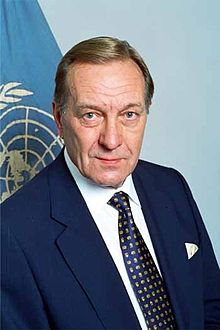Harri Holkeri
| Harri Holkeri | |
|---|---|
 |
|
| 57th Prime Minister of Finland | |
|
In office 30 April 1987 – 26 April 1991 |
|
| President | Mauno Koivisto |
| Deputy |
Kalevi Sorsa (1987–1989) Pertti Paasio (1989–1991) |
| Preceded by | Kalevi Sorsa |
| Succeeded by | Esko Aho |
| Special Representative of the Secretary-General for Kosovo | |
|
In office 25 August 2003 – 11 June 2004 |
|
| Preceded by | Michael Steiner |
| Succeeded by | Søren Jessen-Petersen |
| Personal details | |
| Born |
6 January 1937 Oripää, Finland |
| Died | 7 August 2011 (aged 74) Helsinki, Finland |
| Nationality | Finnish |
| Political party | National Coalition Party of Finland |
| Spouse(s) | Marja-Liisa Lepistö |
| Alma mater | University of Helsinki |
| Profession | Master of Political Sciences |
Harri Hermanni Holkeri KBE (Finnish pronunciation: [ˈhɑrːi ˈhermɑnːi ˈholkeri]) (6 January 1937 – 7 August 2011) was a Finnish statesman representing the National Coalition Party of Finland (Kokoomus / Samlingspartiet). He was the Prime Minister of Finland 1987–1991,speaker of the UN General Assembly 2000–2001 and headed the United Nations Interim Administration Mission in Kosovo from 2003- 2004 (leaving the position in the spring of the second year because of health issues).
Harri Holkeri was member of the board of directors of the Bank of Finland from 1978–97, and candidate in the president elections of 1982 and 1988. He also served as a member of Parliament from 1970 to 1978 and as the chairman of the National Coalition (Conservative) Party from 1971 to 1979. On 1 July 1991 he made the world's first GSM call. The historic call used Nokia gear on GSM's original 900MHz band.
He chaired the United Nations General Assembly, 2000–2001. He also played a constructive role in securing the Good Friday Agreement in Northern Ireland.
Holkeri was awarded the highest Finnish honorary title of Counselor of State in 1998 by the President of Finland Martti Ahtisaari.
Holkeri's efforts in Northern Ireland were rewarded with an honorary knighthood from Queen Elizabeth II of the United Kingdom.
...
Wikipedia
